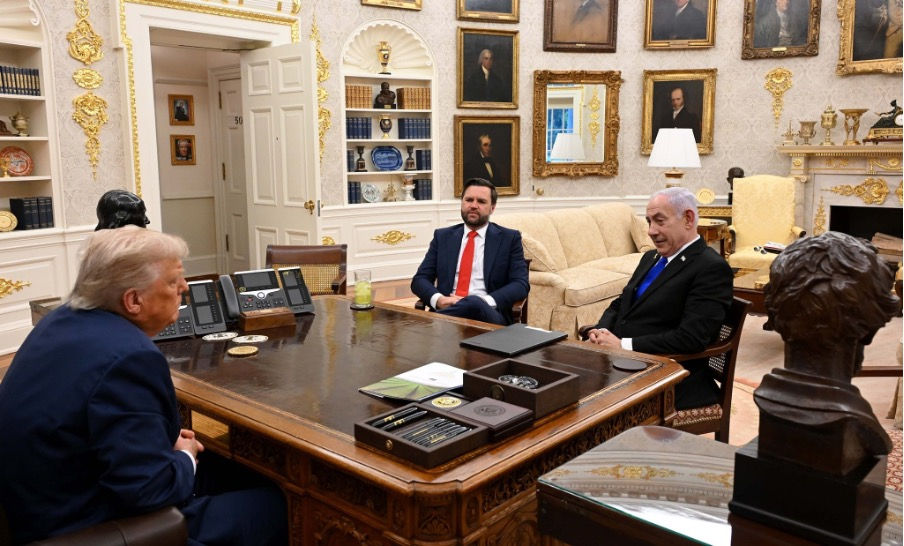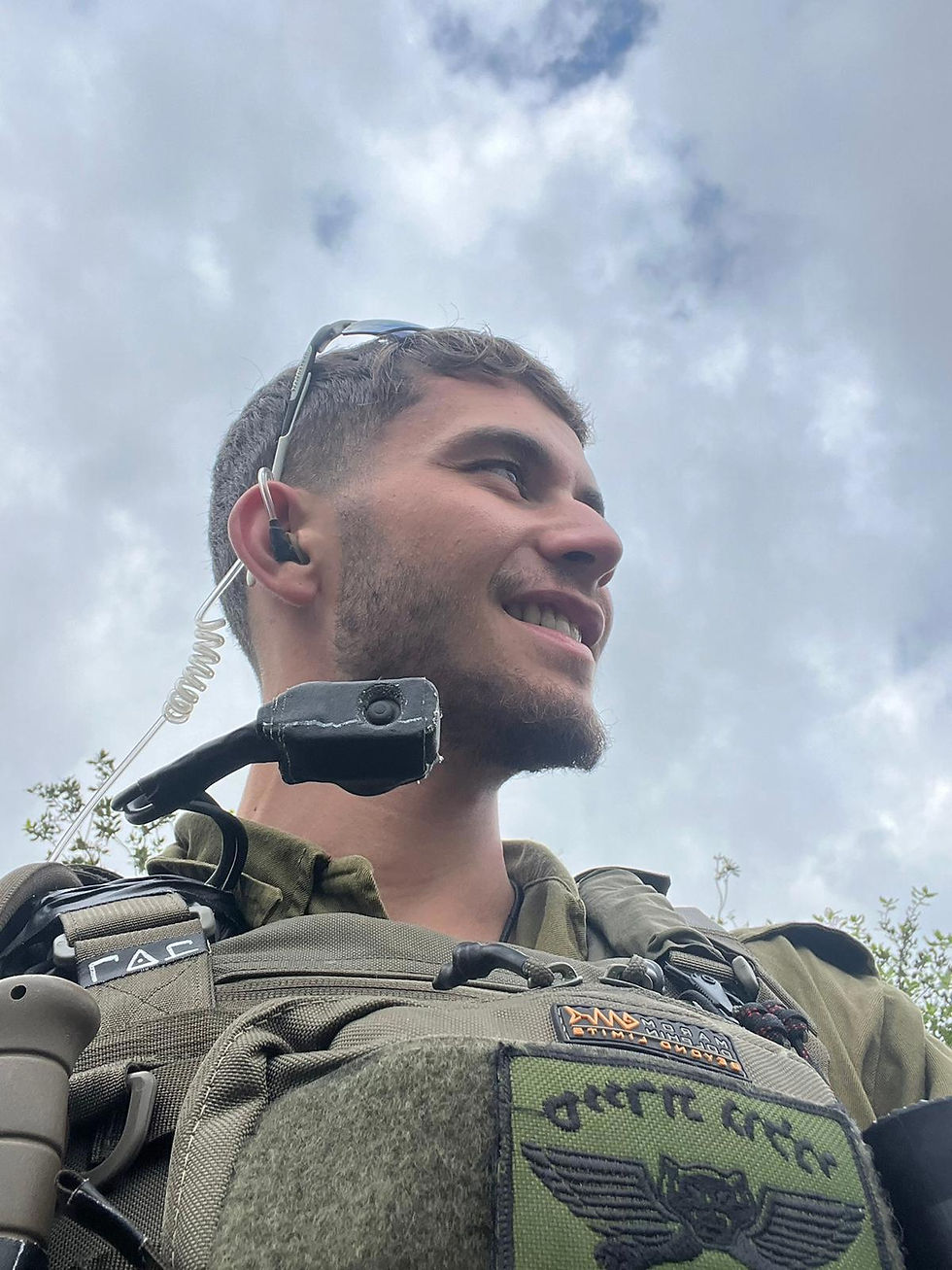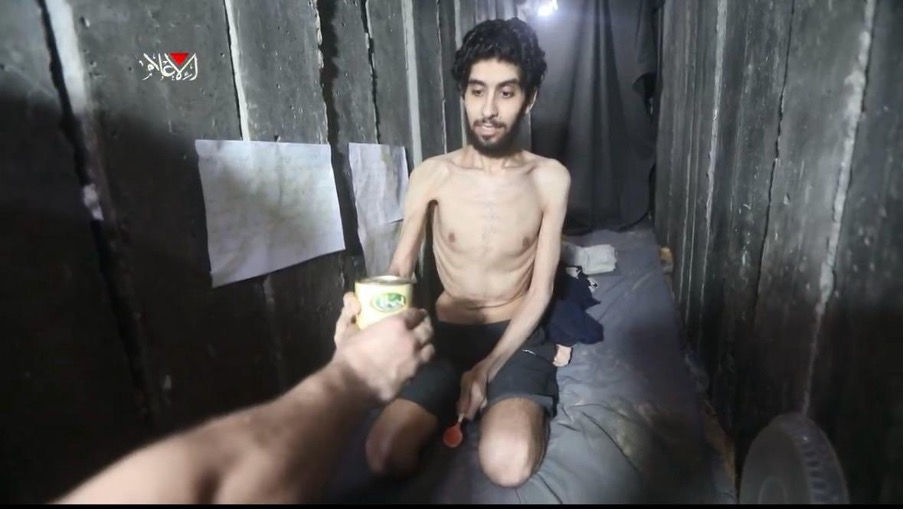Week #92 | Israel Weekly War Summary | July 6-July 12 ,2025
- IDSF

- Jul 14
- 11 min read

Prime Minister Netanyahu meeting with President Trump and Vice President Vance| Source: Prime Minister of Israel on X
Overview
IDF statistics show that 70% of Israeli combat fatalities in Gaza have been caused by IEDs, not direct gunfire or combat.
Yasser Abu Shabab, the leader of the growing anti-Hamas militia in southern Gaza, stated that 6,000 Gazans have formally applied to join his militia.
A terrorist attack in the parking lot of a shopping mall in Gush Etzion resulted with one murdered by 2 Palestinian Authority policemen.
IDF launched Operation Black Flag against the Houthis, the tenth and eleventh wave of aerial attacks against Houthi infrastructure. This operation was more extensive than previous operations, involving 20 fighter jets and 50 munitions.
In a high-profile interview with Tucker Carlson, Iranian President Masoud Pezeshkian made the explosive claim that Israel had attempted to assassinate him.

Gaza
Hostage Deal
Reports of an imminent ceasefire agreement during Prime Minister Netanyahu’s meetings in DC were exposed to be exaggerated, as there are still four central points of contention between Israel and Hamas that are preventing an agreement:
The number of Palestinian security prisoners to be released as part of a hostage deal.
The number of aid trucks permitted to enter Gaza each day—crucial for humanitarian support but also a potential supply line for Hamas.
Whether the GHF (Gaza Humanitarian Force) will be allowed to continue operating independently of Hamas, or whether Hamas will regain total control over aid distribution.
The demand for guarantees from Donald Trump that the 60-day ceasefire period will culminate in a permanent end to the war.
5. Hamas is calling for the IDF to surrender the Morag Corridor, and withdraw back to the Philadelphi Corridor, which would represent a major Israeli concession on a critical tactical front.
Before departing for Washington, Prime Minister Benjamin Netanyahu delivered a speech outlining Israel’s war and negotiation strategy. He reiterated that a permanent ceasefire would take place but will only proceed under Israel’s conditions: Hamas must disarm, lose its governance and military capabilities, and Gaza must be fully demilitarized.
Analysis:
Ceasefire negotiations continue as Hamas, under the leadership of Izz ad-Din al-Haddad, seeks to leverage the talks to gain territorial and strategic advantages. Hamas is demanding that Israel withdraw from a significant portion of the territory captured during the war, much of which was taken at great military cost. The group intends to use any ceasefire as a temporary pause to rebuild its military strength, particularly by restoring key infrastructure such as tunnels and logistical routes.
Furthermore, Hamas is pressing for a halt to the GHF (Gaza Humanitarian Force) operations, which have challenged its monopoly in aid distribution. The group’s objective is to regain complete control over humanitarian aid flows, which it has consistently diverted to support its military and political apparatus by making the Gazan civilian society dependant on Hamas for humanitarian aid. Additionally, Hamas is preparing to retaliate against southern Gaza clans that participated in GHF activities or challenged its authority. This poses a severe risk to future governance alternatives in the Strip, as successful retribution by Hamas would likely deter future local resistance and cooperation with post-Hamas stabilization efforts.
Operational
According to Chief of Staff, Eyal Zamir, since the beginning of Operation Gideon’s Chariots, the IDF has eliminated over 1,300 Hamas operatives.
Five IDF divisions are currently deployed in Gaza, encompassing virtually the entire regular combat force of the Israeli army. With Iran no longer the immediate focal point, the main axis of military attention has shifted back to Gaza.
One of the most lethal threats faced by Israeli troops in recent months has been explosive devices (IEDs). IDF statistics show that 70% of Israeli combat fatalities in Gaza have been caused by IEDs, not direct gunfire or combat. This Hamas tactic forced the IDF to level cities to the ground in order to protect the troops.
Between the Philadelphi Corridor and the Morag Axis, the IDF is constructing what it calls a “Humanitarian City”, a 45-square-kilometer zone that will accommodate approximately 600,000 Gazans evacuated from the Muwasi area. Entry will require individual security screening, and once inside, residents will not be permitted to leave. The enclave is designed to be a sterile, Hamas-free zone, yet it will not include any IDF presence along the immediate perimeter. It will instead be administered by international actors, while the IDF secures the perimeter routes and Yasser Abu Shabab’s militia assumes policing responsibilities, specifically neutralizing Hamas infiltrators. Importantly, Israel has stated it will not withdraw from this area under any future hostage deal, making it a non-negotiable foothold for postwar control. The idea is to separate the civilian population from the Hamas terrorists who have used the civilians as human shields by embedding themselves in humanitarian zones.
IDF Division 98 continues its intensive campaign in the Shejaiya and Zeitoun neighborhoods of Gaza City, where Hamas maintains significant urban combat infrastructure.
IDF’s Arabic-language spokesperson issued a public call for the evacuation of all tents from the western Khan Yunis region, directing civilians either toward the coastal strip or northward. This directive specifically targets tents that may be harboring Hamas militants fleeing Khan Yunis, while Israeli UAVs conduct targeted strikes to locate and eliminate these escapees.
Hamas attempted to kidnap an Israeli combat engineer, who resisted the assault and was ultimately killed during the struggle.
The Golani Brigade, in coordination with the elite Yahalom engineering unit, discovered and destroyed a 13-meter-deep, 500-meter-long tunnel in Khan Yunis. Over the past week alone, Golani forces have neutralized dozens of militants and eliminated hundreds of Hamas targets, including both underground facilities and above-ground command posts.
There are tensions between Israel’s military and political leadership over the future trajectory of the Gaza campaign. The security establishment supports a hostage deal, arguing for the release of as many captives as possible before resuming full-scale operations to eliminate Hamas. However, military operations are currently constrained due to the presence of hostages in urban centers, limiting the army’s ability to carry out high intensity strikes on key Hamas strongholds.
Internal Resistance to Hamas
Yasser Abu Shabab, the leader of the growing anti-Hamas militia in southern Gaza, stated that 6,000 Gazans have formally applied to join his militia, including 3,000 civilians for non-combat roles. He also claimed that 80,000 civilians have requested to relocate to the humanitarian zone, a sign of growing popular demand for an alternative to Hamas governance.
In a bold operation, Abu Shabab’s fighters reportedly raided a Sahm unit tent—a Hamas-affiliated internal security force—in the buffer zone between Rafah and Khan Yunis, capturing several of their members. This incident highlights the increasing military capacity and confidence of the militia.
Abu Shabab has publicly announced his intent to rebuild Rafah on a foundation of justice and security, casting himself as a potential emir or local ruler. According to multiple reports, he may be the Israeli-backed candidate to lead Gaza in a self-governance framework—a “day-after” scenario being explored if mass emigration plans do not materialize. His emergence marks the most significant internal political challenge to Hamas in years, and a possible model for post-conflict civilian authority.
The internal conflict in Gaza took a dramatic turn as the Joint Command Room of the Palestinian factions issued its first statement since October 2024, denouncing the Abu Shabab militia. The factions described the group as a rogue and treacherous entity allegedly serving Israeli interests. The statement accused Abu Shabab of trying to achieve through betrayal what Israel could not accomplish through force, warning that the group is now formally excommunicated and marked for elimination.
Shortly after, Hamas’s “Sahm” unit, part of the group’s Ministry of Interior, reported that three members of the Abu Shabab group had surrendered to the leadership of the “resistance.” In an interview with Israeli media, Abu Shabab denied collaboration with Israel and explained that he had founded the militia after Hamas killed many members of his clan. He claimed to have established the force with backing from the Palestinian Authority and its advisor Mahmoud al-Habbash, and stated that Hamas is now militarily weakened, relying mainly on untrained youth recruits. Abu Shabab expressed confidence that Hamas’s downfall is near.
Domestic Israel

In a landmark technological achievement, Israel’s most advanced communications satellite, Dror-1, was successfully launched into orbit from Cape Canaveral, Florida, aboard a SpaceX rocket. The satellite weighs 4.5 tons and, with its 17.8-meter solar array fully deployed, is the largest of its kind ever launched by Israel. It features two reception antennas, each 2.8 meters in diameter, the largest on any Israeli satellite to date. Dror-1 is expected to serve Israel’s communication infrastructure for the next 15 years, and marks a significant leap in civilian and defense communications capabilities.
Judea and Samaria
In ongoing IDF security raids, five wanted individuals were arrested in Jenin, including a man attempting to reestablish a terrorist cell. Concurrently, Battalion 941 of the Menashe Brigade arrested four additional suspects in a nearby village. A significant weapons cache was discovered and confiscated, including: six firearms (pistols, M-16 rifle, Carlo gun), ammunition, magazines, two tactical vests, communication devices, and both stun and gas grenades.
At the Gush Etzion Junction, security guard Shalev Zvuluny (22) was stabbed and shot to death outside a shopping mall. The perpetrators were later identified as Palestinian policemen—members of the Palestinian Authority’s police force—further fueling concerns over the radicalization of PA security officers. Notably, one of the attackers had undergone military training at a Qatari military college, highlighting an alarming trend of radicalized elements within official PA institutions
Tensions flared as a Palestinian-American man was allegedly killed during a violent altercation involving Israeli settlers. The PA Health Ministry reported that a second Palestinian, Mohammed Rizq Hussein al-Shalabi (23), also died after being shot and left to bleed for hours, although the PA Health Ministry have refused to hand over the bodies to Israeli forces for examination or provide physical evidence regarding the alleged circumstances of the deaths. According to the IDF, the incident began after Palestinians threw rocks, injuring two Israelis, and then escalated into physical clashes, property vandalism, and arson. Israeli police and military units arrived to disperse the confrontation using riot control measures, and two Israeli settlers were arrested. The case is currently under joint investigation by the Israeli Police, the Shin Bet, and the Military Police.
Lebanon

Diplomatic
In Beirut, Lebanese President Joseph Aoun hosted a European delegation led by EU Ambassador Sandra De Waele, along with ambassadors from various EU member states. In the meeting, Aoun issued a firm call for European support in reclaiming Lebanon’s full territorial sovereignty. He urged the EU to lift all sanctions currently imposed on Lebanon and proposed the launch of a comprehensive Euro-Arab conference to assist with Lebanon’s economic recovery and military rebuilding. He emphasized the need to support the Lebanese Armed Forces by every available means in order to restore state control and national security.
Aoun also addressed the regional refugee crisis, stating that the stability of Syria directly benefits Lebanon, and stressed the importance of facilitating the safe, dignified, and coordinated return of Syrian refugees to their homeland. These comments reflect mounting domestic pressure in Lebanon due to the socio-economic burden of long-term displacement.
Operational
Across the Lebanon-Israel border, active military operations continue, particularly in the western sector where Division 91 and the Galilee Formation are responsible for frontline control. The elite “Baram” Task Force has been operating extensively in this zone, and recently located and destroyed a Hezbollah compound that contained weapons stockpiles and fortified combat positions. Reserve forces from the “Oded” Brigade discovered a large weapons cache in dense brushland, including a heavy machine gun, dozens of IEDs, and a multi-barrel rocket launcher.
Israeli drones eliminated the Hezbollah artillery commander responsible for operations in the coastal sector. Additional airstrikes targeted a Hezbollah command center in southern Lebanon.
In an interview, Hezbollah Secretary-General Naim Qassem revealed that Hezbollah was not informed in advance of the October 7th attack and that Nasrallah only learned about the operation 30 minutes after it began. According to Qassem, Hezbollah’s decision to engage militarily was limited to a “supporting battle,” not a full-scale war, and the group had no organized plan to unify the regional fronts at the time.
He also stated that Iran was not aware of the operation, and that even parts of Hamas’s foreign leadership were kept in the dark. Despite this, Qassem confirmed that Iran has continued to provide military, financial, political, media, and intelligence support to Hezbollah and its allies in the region.
Syria

Diplomacy
Syrian President al-Sharaa traveled to Abu Dhabi for a meeting with UAE President Mohammed bin Zayed. The two leaders discussed deepening economic cooperation, with Syria expressing its desire to forge a strategic partnership with the UAE.
The U.S. State Department removed Hayat Tahrir al-Sham (HTS)—the militant group formerly known as Jabhat al-Nusra—from its list of designated terrorist organizations.

Iraq
A historic development occurred in Sulaymaniyah, where a delegation from the PKK (Kurdistan Workers’ Party) participated in a formal disarmament ceremony. After 40 years of armed conflict with Turkey, the PKK began the process of surrendering its weapons, marking a potential turning point in Iraqi-Kurdish-Turkish relations and regional stability.
Yemen
Following continued Houthi missile and drone attacks on Israeli territory, the IDF Arabic spokesperson issued a direct warning ahead of strikes targeting three Houthi ports and the local power station. This marked the launch of Operation Black Flag, the tenth and eleventh wave of aerial attacks against Houthi infrastructure.
This latest round was notably more extensive than previous operations, involving 20 fighter jets and 50 munitions. The strikes successfully disabled all three targeted ports and hit the main power facility. Most notably, the Galaxy Leader, a ship hijacked by the Houthis in November 2023 and retrofitted as a terror platform with radar systems, was sunk during the operation.
In retaliation, the Houthis claimed to have launched three ballistic missiles and eight drones toward Eilat. Separately, they attacked a Greek-owned ship, Magic Seas, which they alleged was enroute to Israel. The crew abandoned ship, and the vessel began to sink. The United States condemned the attack, stating the ship was heading to Egypt, not Israel.
Another Greek-owned vessel, reportedly enroute to Saudi Arabia, was attacked the following day. That assault resulted in casualties on board, further escalating maritime tensions in the Red Sea and Gulf of Aden.
Iran

Israeli Defense Minister Israel Katz announced that Israel is actively preparing enforcement plans to counter any Iranian efforts to rebuild its missile and ballistic weapons programs. Katz emphasized the importance of preserving the Israeli Air Force’s freedom of action and vowed to prevent any foreign power from enabling Iran’s military rehabilitation, particularly in the wake of Israeli strikes that had targeted sensitive infrastructure earlier this year.
In a high-profile interview with Tucker Carlson, Iranian President Masoud Pezeshkian made the explosive claim that Israel had attempted to assassinate him.
Iranian Foreign Minister Abbas Araghchi met with his Saudi counterpart Faisal bin Farhan to discuss the future of Iran-Saudi relations.
President Pezeshkian also held a phone conversation with European Council President Antonio Costa, during which he declared that Iran’s cooperation with the IAEA (International Atomic Energy Agency) would depend on the elimination of double standards in global nuclear oversight. At the BRICS summit in Brazil, Araghchi condemned Israeli attacks inside Iran and criticized the United States for supporting these strikes.
International
French President Emmanuel Macron and British Prime Minister Keir Starmer jointly affirmed that any future nuclear agreement must prioritize Western security interests, and reiterated that Iran must never be allowed to acquire nuclear weapons.
Fallen Soldiers
Staff sergeant Meir Shimon Amar z"l
Sergeant Moshe Nissim Frech z"l
Staff sergeant Noam Aharon Musgadian z"l
Sergeant first class (res.) Benyamin Asulin z"l
Staff sergeant Moshe Shmuel Noll z"l
Master sergeant (res.) Abraham Azulay z"l
Captain Reei Biran z"l










Comments